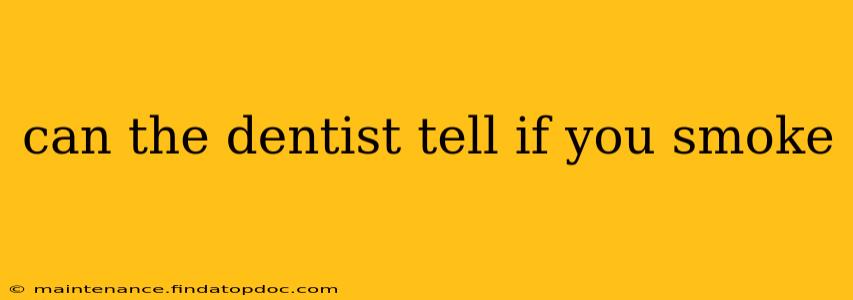Yes, dentists can often tell if you smoke, and it's not just from the smell. While the telltale smell of smoke on your breath is a strong indicator, dentists have several other ways to detect smoking habits during your routine check-up. Let's explore how they do it.
How Can a Dentist Detect Smoking?
Dentists are trained to spot the oral health effects of smoking, which are often visible during a standard examination. Here are some key signs:
1. Yellow or Brown Stained Teeth: This is perhaps the most obvious sign. Nicotine and tar in cigarettes stain teeth, leading to a yellow or brown discoloration that’s difficult to remove with regular brushing and flossing. The staining is often more pronounced along the gum line.
2. Bad Breath (Halitosis): The lingering smell of smoke is a clear giveaway. Even if you've brushed your teeth, the odor can persist due to the chemicals absorbed into your tissues. This persistent bad breath is often different from bad breath caused by other factors.
3. Gum Disease (Periodontal Disease): Smoking significantly increases the risk of gum disease. Dentists look for signs of gingivitis (red, swollen gums that bleed easily) and periodontitis (more advanced gum disease leading to bone loss and tooth loss). They may notice pockets of infection around the teeth that are deeper than normal.
4. Oral Leukoplakia: This is a condition characterized by white patches or lesions on the gums, tongue, or inner lining of the cheeks. While not all leukoplakia is caused by smoking, it’s a strong risk factor and a significant warning sign that requires further investigation.
5. Slow Wound Healing: Smoking reduces blood flow, which impairs the healing process. If you have any oral injuries or procedures, like extractions, dentists may notice slower than average healing. This can also affect the success of dental implants.
6. Increased Risk of Oral Cancer: Smoking is a major risk factor for oral cancer. Dentists carefully examine the soft tissues in your mouth for any unusual growths, lumps, or sores. While these aren't exclusive to smokers, the increased risk is a significant consideration.
What if I Don't Want My Dentist to Know I Smoke?
While honesty is always the best policy, you can try to minimize the obvious signs by:
- Quitting Smoking: This is the most effective way to prevent the visible and health effects of smoking.
- Improved Oral Hygiene: Regular brushing, flossing, and using mouthwash can help minimize staining and bad breath. However, this won’t erase the other potential indicators discussed above.
- Professional Teeth Whitening: While whitening can lighten the stains, it won't mask the other telltale signs of smoking.
Does My Dentist Have to Report My Smoking?
No, dentists are not required to report your smoking habits to anyone. The information they gather during your examination is confidential and covered by HIPAA (Health Insurance Portability and Accountability Act) regulations in the United States. However, they will use this information to inform your treatment plan and advise you on improving your oral health.
Why is it Important for My Dentist to Know?
It's crucial for your dentist to be aware of your smoking habits because it directly impacts your oral health and the success of any dental treatment. They can then:
- Provide tailored advice: They can offer personalized guidance on how to minimize the damaging effects of smoking.
- Recommend appropriate treatment: They can adjust treatment plans to account for the increased risk of complications.
- Identify potential health risks early: Early detection of oral health problems can significantly improve treatment outcomes and overall health.
Ultimately, open communication with your dentist is vital for optimal oral health. While they may be able to detect smoking through various signs, a candid conversation allows for better collaboration and improved care.
